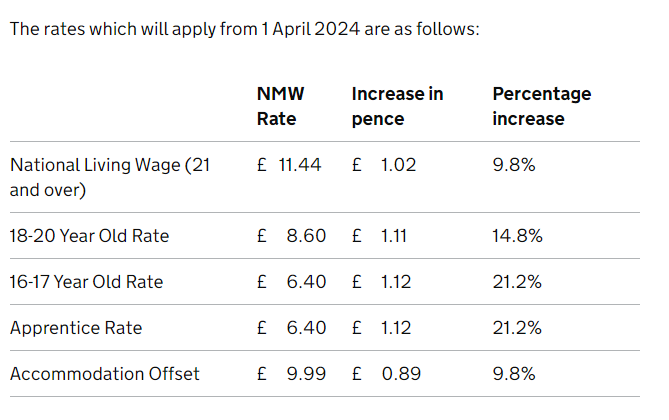Will a higher minimum wage result in higher inflation in 2024
ACE Finance Director asks agent from Bank of England the likely impact of minimum wage increases in 2024 will have on SMEs and Inflation!

ACE Finance Director asks Bank of England
In the latest UK economic and recruitment market updates with the Bank of England, the agent responded that historically increases in minimum wage have been offset by lower increases in higher paid earners resulting in minimal impact on inflation, they had also noticed an uplift in spend on the high street in the subsequent months. However in 2024 it is anticipated that the rise in minimal wage will have an impact on inflation due to the current workforce shortfalls and difficulty employers are seeing to attract and retain key senior workers.
UK Minimum wage background
The UK minimum wage is a legally mandated hourly wage that employers are required to pay their employees. The minimum wage was first introduced in the UK in 1999 and has since been increased several times. The purpose of the minimum wage is to ensure that all workers are paid a fair wage for their work and to prevent employers from exploiting their employees. Over the years, the UK government has increased the minimum wage to keep pace with inflation and to ensure that it remains an effective tool for addressing poverty and inequality in the workforce. The UK minimum wage has been subject to several increases over the years, and these increases have generally been linked to inflation with the next increase of 9.8% from April 2024 to £11.44. The coming year will also see a far greater % increase for workers who are under 20 years of age or on apprenticeships.
The UK government considers economic factors, including inflation, productivity, and the overall state of the labour market to strike a balance between increasing the minimum wage to keep pace with inflation and ensuring that it does not have a negative impact on businesses or employment levels.
What is the impact of minimum wage on businesses?
The impact of minimum wage on businesses can vary depending on several factors, including the size of the business, the industry it operates in, and the overall economic climate. Here are some of the potential impacts that minimum wage increases may have on businesses:
1. Increased Labour Costs: One of the most direct impacts of a minimum wage increase is that it will increase labour costs for businesses that employ workers who earn minimum wage. This is particularly challenging for small businesses that don’t have large profit margins to absorb these additional costs.
2. Reduced Profits: As labour costs increase, businesses may see a reduction in their profits if they are unable to pass on these costs to consumers through price increases. This can be particularly challenging for businesses that operate in highly competitive industries where profit margins are already slim.
3. Increased Productivity: There is research and theory that minimum wage increases can lead to increased productivity among motivated workers. However, this can also result in some workers realising the minimum rate for their inputs.
4. Employee Turnover: Theory suggests that a minimum wage increase may also reduce employee turnover, as workers may be less likely to leave their jobs if they are paid a higher wage. However, this is unlikely when mandated on all workers and where skills are easily transferable to other sectors which could be considered easier.
5. Improved Reputation: Businesses that pay their employees a fair wage may also see benefits in terms of their reputation among customers and the wider community. By demonstrating a commitment to fair pay, businesses can enhance their brand image and attract more socially conscious consumers.
Overall, the impact of minimum wage increases on businesses can be complex and will depend on a range of factors. While some businesses may experience increased costs and reduced profits, others may benefit from increased productivity and reduced turnover. Ultimately, the impact of minimum wage increases will depend on the unique circumstances of each business.
What is impact of increasing minimum wage on supervisor / mid management level?
There is some evidence to suggest that increasing the minimum wage may have negative impacts on supervisors and mid-level management in some industries. Here are some potential ways that minimum wage increases may affect these workers:
1. Wage Compression: When the minimum wage is increased, it can create wage compression within a company. This means that workers who were previously earning slightly more than the minimum wage may now be earning the same as or only slightly more than entry-level workers. This can be particularly challenging for supervisors and mid-level managers, as they may feel that their skills and experience are not being fairly compensated.
2. Reduced Hours or Benefits: Some businesses have responded to minimum wage increases by reducing hours or benefits for supervisors and mid-level managers in order to offset the increased costs of paying minimum wage workers more.
3. Increased Workload: Some businesses have responded to a minimum wage increase by reducing the number of supervisory or mid-level management positions and increasing the workload for remaining workers. This can result in increased stress and burnout for these workers.
What are the main business sectors being impacted by minimum wage increases?
Minimum wage increases impacts businesses across all sectors, but some sectors are likely to be more affected than others. Here are some of the main business sectors that may be impacted by minimum wage increases:
1. Retail: The retail sector employs a significant number of minimum wage workers, particularly in roles such as sales assistants and cashiers. As a result, minimum wage increases are likely to have a significant impact on the retail sector, particularly for businesses that operate on tight profit margins.
2. Hospitality and Tourism: The hospitality and tourism sectors also employ a large number of minimum wage workers, particularly in roles such as waitstaff, bartenders, and hotel cleaners. Minimum wage increases can impact businesses in these sectors by increasing labour costs and potentially reducing profits.
3. Healthcare: While many healthcare workers earn above the minimum wage, some entry-level roles such as healthcare assistants may be impacted by minimum wage increases. This may be particularly relevant for private healthcare providers that rely on low-wage workers.
4. Social Care: The social care sector, which includes roles such as care assistants and support workers, is also likely to be impacted by minimum wage increases. This sector has historically relied on low-wage workers, and minimum wage increases may be necessary to improve working conditions and attract and retain workers.
5. Cleaning and Facilities Management: The cleaning and facilities management sector employs a significant number of low-wage workers, particularly in roles such as cleaners and security guards. Minimum wage increases may be necessary to ensure that these workers are paid a fair wage and to improve retention rates in the industry.
It's worth noting that minimum wage increases may impact businesses differently depending on their size, location, and other factors. However, the above sectors are likely to be among the most impacted by minimum wage increases in the UK.
Could a rise in minimum wage increase inflation?
Yes, there is some debate among economists about whether a rise in minimum wage could increase inflation. Here are some of the arguments for and against:
Arguments for a rise in minimum wage increasing inflation:
1. Increased Labour Costs: When businesses are required to pay higher wages to their employees, their labour costs increase. To offset these costs, businesses may raise prices on their goods and services, leading to inflation.
2. Increased Consumer Spending: When workers earn more money, they may have more money to spend on goods and services. This increased demand for goods and services can drive up prices, leading to inflation.
Arguments against a rise in minimum wage increasing inflation:
1. Increased Productivity: Some economists argue that when workers earn more money, they may be more productive and efficient, leading to lower costs for businesses. This could offset the increased labour costs associated with a rise in minimum wage and prevent inflation.
2. Minimal Impact on Prices: In some cases, businesses may be able to absorb the increased labour costs associated with a rise in minimum wage without raising prices. This could prevent inflation from occurring.
3. Offsetting Factors: Inflation is influenced by a range of economic factors, including interest rates, exchange rates, and supply and demand. A rise in minimum wage is just one factor that can impact inflation, and its effects may be offset by other factors in the economy.
Overall, the impact of a rise in minimum wage on inflation is likely to vary depending on a range of economic and political factors. While it's possible that a rise in minimum wage could lead to inflation, it's also possible that its effects on inflation could be minimal or offset by other factors in the economy.








